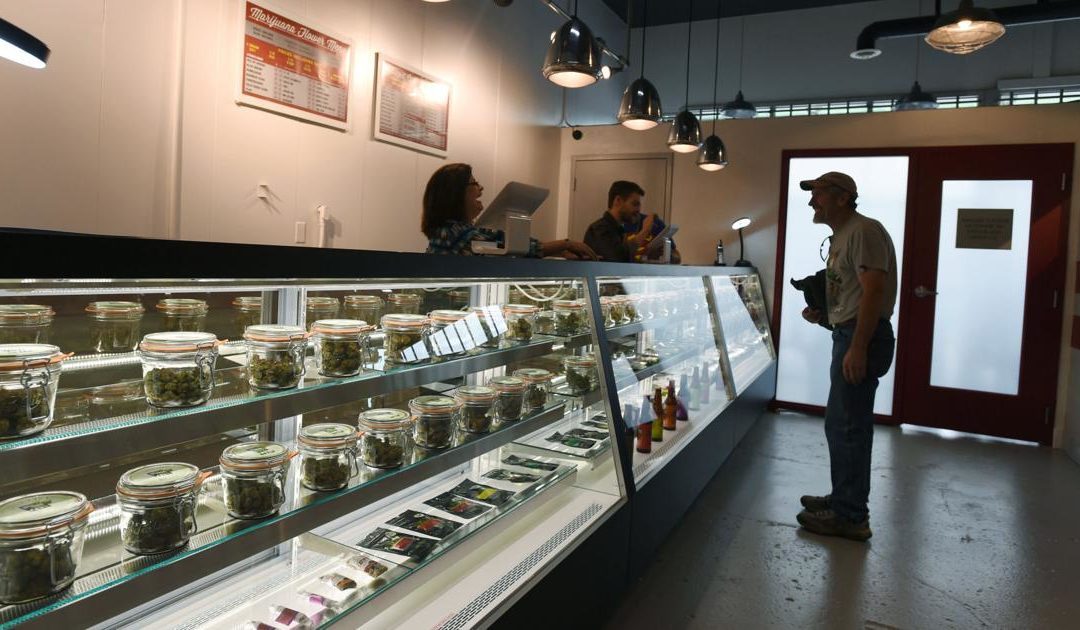A citizens group filed ballot language Monday with the Colorado Springs City Clerk’s Office that could ask voters in a special election to legalize recreational marijuana sales at existing medical dispensaries.
The proponents argue taxes on expanded sales could generate $10 million to $15 million annually that could be used to fund mental health services, post-traumatic stress disorder treatment programs for veterans, and public safety, a news release said. The group noted that recreational marijuana is already available in nearby communities, such as Manitou Springs, and Colorado Springs is losing tax revenue to those communities.
Opponents said expanded access could lead to an increase in property crime around shops and would not stem black market sales.
An early step in placing the question on the ballot — filing the language — triggered some drama Monday, with proponents sending out a news release saying they had been denied the opportunity to file.
City Clerk Sarah Johnson said she had no intention of blocking them from filing the language, she just wanted them to be aware that the timing of the filing could trigger a special election. If they waited two weeks, the question would go on the November ballot, she said.
“You are making that choice today,” she told them in a meeting attended by several members of the press.
The timing of the election depends on how long it takes to get through the process, so the question could still make the November ballot, she said in a follow-up interview. A special election could cost $400,000 to $450,000. Participating in a November election can cost between $180,000 to $300,000 depending on the questions on the ballot and who participates, she said.
Cliff Black, an attorney and the lead elector petitioning the city, said after the meeting that the group didn’t want to wait two weeks to file the question, so it would have time to work with city staff on crafting and revising the ballot language. He said he was concerned about delays in the city process.
It wasn’t clear to him why the ballot language was initially denied, he said.
“I think Sarah Johnson did just want to go through the process with us to make sure we were making a clear and informed decision,” he said.
Black and his fellow organizers must still go through the city’s internal processes for placing a question on the ballot and collect signatures. Since the group is aiming to change the city’s charter, it would need to collect about 30,000 valid signatures in 90 days, Johnson said. She suggests organizers collect about double the number of signatures needed to ensure they have enough that are valid.
The Colorado Springs City Council weighed placing a question to legalize recreational marijuana sales in 2020, but it did not gain enough support from councilmembers who had concerns it could hurt the town’s chances of retaining U.S. Space Command. The question was also unpopular with the marijuana industry because it would have allowed only 24 stores to transition to recreational sales.
“Politicians have declined to provide a regulatory structure to collect precious tax revenue for our city. Today, Colorado Springs residents are taking this decision back into our own hands to finally give ourselves the choice to vote on allowing recreational sales in our community,” said Karlie Van Arnam, a former Colorado Springs City Council candidate who was the general manager of Pure Medical, a medical marijuana business, when she ran last year, and a member of the petitioning group.
If the question moves forward, Mayor John Suthers said he would oppose it.
At the time the council weighed a local ballot question in 2020, past promises made by supporters of the 2012 statewide measure that legalized recreational marijuana sales in Colorado — such as reining in the black market — had not been kept, Suthers said. The city has wrestled in recent years with the high cost of enforcement, he said.
Luke Niforatos, executive vice president at Smart Approaches to Marijuana — an Alexandria, Va., based organization that advocates for a “health first” approach to marijuana that “neither legalizes, nor demonizes” it — said expanding marijuana recreational sales would contribute to property crime, particularly around the shops, increased access and exposure among children and teenagers. He noted the expansion of the industry is, to some degree, mirroring the growth of big tobacco, with release of more potent THC products.
His group sees it as a public health issue that is reversing some of the gains made in recent decades against cigarettes.
“Opting out of sales means less storefronts advertising … less availability of these products,” he said.
This content was originally published here.

